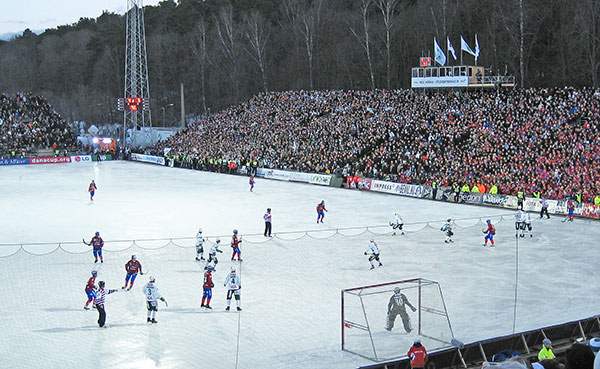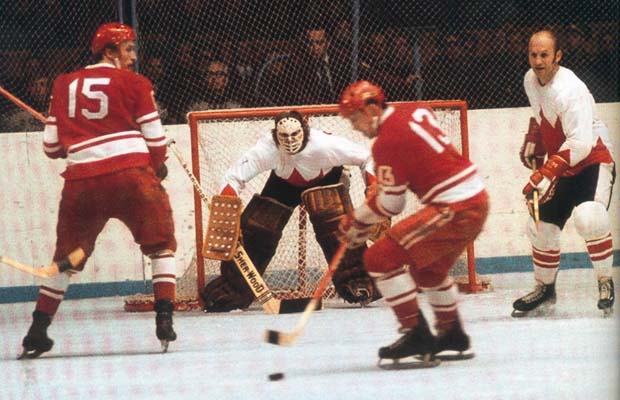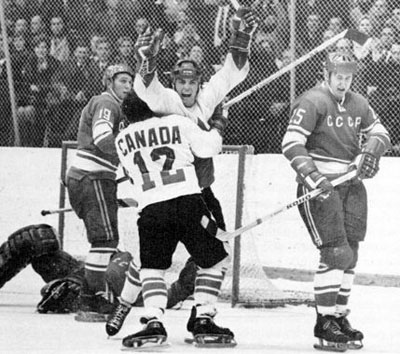
The World Junior Hockey Tournament is currently underway in Alberta unbeknownst to anyone outside of Canada, and a small handful of Hockey Cultists in the States. The World Juniors are a hockey version of March Madness for Canadians. Junior Hockey is the highest level of amateur hockey in the world today, played by boys between 16 & 20 years old. This is as close as Canada comes to big time college sports, and they take this sh!t really seriously.
In Canada, the teenage kids that show the most promise of making it to the pro’s sign contracts during their high school years, move away from home to live with host families in the cities where they play, and play a full professional hockey schedule, traveling across the country in buses, playing in front of small town crowds, and busting each other in the jaw as they chase their dreams. It’s what minor league baseball was a century ago, before money turned it into a professional sport.
Each year at the holidays the best Under 20 players in the world represent their country in a two week long international tournament. The winners are crowned World Champions, given a gold medal, and then sent back to po-dunk-ville to play out the remainder of the season, and hopefully move into the pro’s someday. As I said at the beginning, aside from Canadians and a handful of hockey nuts in the U.S., no one in the world pays any attention to this.
Which is kind of sad really, because now that the Olympics & World Championships are open to professionals, and College Sports have become de-facto professional sports, the World Juniors is as close to a true amateur championship as is left in the stick & ball sports. It wasn’t always this way.
Once upon a time the Olympics represented the pinnacle of amateur sports where athletes with day jobs competed for glory, and little else in return. That began to change a long time ago. After World War Two when the Soviet Union decided to make amateur sports a marketing tool for the Soviet system, and started 24/7 year round training of “amateur” athletes, it was only a matter of time.
Until the 1940’s, no one in the Soviet Union even played ice hockey. What they played was a version of field hockey on skates called “Bandy”. Played on a soccer sized ice rink without boards, using a ball, and curved wooden stick, it had little in common with the sport of ice hockey, besides ice.
There is probably no greater testament to the effectiveness of focused, centralized planning than the Soviet athletic system. Given total control, and ample resources, within a span of 10 years they managed to turn a handful of bandy players into the best international ice hockey players in the world. In 1954 they announced their arrival on the world stage by beating Canada for the Gold Medal at the world championships.
Canadians are a funny lot. They are as unassuming, and self deprecating a bunch of folks as you will ever find, except when it comes to hockey. Where hockey is concerned they rival the U.S. in jingoistic nationalism. So losing to the Soviets was a blow to their pride. And when the Soviets continued to dominate international ice hockey for the next 16 years, the only way that the Canadians could reconcile it in their mind was to assure themselves that the Soviets were using what amounted to professional hockey players, to play against a handful of true amateur junior teams from Canada. Surely if Canada were to put their best professional players out on the ice there would be no contest. (An argument that Americans would seize upon after losing the gold medal in basketball to the Soviets in the 1972 summer Olympics)
But deep within the Canadian psyche there was a shadow of doubt.
So when it was announced that the Soviet Union would play a team of Canadian NHL All Stars in a series of 8 exhibition games in September of 1972, the entire nation felt at last they would be vindicated, and the Soviets would be set in their place. What followed was a month that came to define for a generation what it meant to be a Canadian.
Growing up in Western New York I was vaguely aware of the 72’ Summit Series from references that were made to it in later years as the Canada Cup became a quadrennial event, and Soviet teams would periodically come to North America to play exhibitions against the NHL. But I never truly understood what the Summit Series meant to Canadians. It is their “Miracle on Ice” times 10.
So I was excited, and curious when I picked up a DVD copy of “Canada Russia ‘72” a Canadian, documentary style mini-series filmed in 2006. Over the course of a couple of evenings this month I watched and was blown away.
Only Canadians could make a film about 1972, and portray the Soviets as protagonists, and themselves as the bad guys. Seriously, if Americans would have filmed this they would have turned it into Rocky 3. To their eternal credit, Canadians are nothing if not honest about their warts, and this miniseries displayed them in all their excruciatingly painful detail. To say that the NHL all stars that were picked to play the Soviets took the games lightly would be an understatement. They couldn’t have been cockier, or more impertinent had they tried. This film doesn’t pull any punches, it shows what a bunch of assh0les the NHL all stars were to each other, and the Soviets.
As the series begins the Canadians are stunned as the Soviets win 2 out of 4 games on Canadian soil, and tie one. The Canadian players are frustrated, and begin to throw tantrums like spoiled children. They cuss, and swear, and fight like hoodlums. By game 4 in Vancouver the country turns against them, and starts booing.
In a post game TV interview Phil Esposito rallies the team, and the country, by looking straight into the camera and delivering one of the most honest and heartfelt appeals I’ve ever seen a professional athlete make. When Game 5 starts in Moscow a week later and the Canadians jump out to a 4-1 lead you get the sense that momentum has shifted, and now they are playing for real.
Then just like that the Soviets score 4 unanswered goals and win 5-4. Down 3 games to 1, with only 3 left to play in Moscow, it looks like the Canadians are toast, but despite their attitudes, and cockiness, you still can’t help but root for them. That my friends is good film making.
They rally and win the next two games by 1 goal, to tie the series at 3-3-1. Then, trailing by 2 goals going into the 3rd period of the eighth and final game, Phil Esposito puts the entire country on his back and scores one of the greatest clutch goals of all time, then sets up Yves Cournoyer to tie the game at 5.
With time ticking down, and 34 seconds left to play Paul Henderson scores the goal heard round the world to put Canada ahead 6-5. Watching the movie, and listening to the actual play by play call of Foster Hewitt I got goose bumps, and wanted to high five somebody. That goal, and the play by play call of “Henderson has scored for Canada” is to Canadians, everything that Al Michaels “Do you believe in miracles?” is for Americans and more.
The movie left me wanting to stand up and sing “O’ Canada” at the end. If you are even remotely a fan of the sport of Hockey, or lived during the cold war years of the 1970’s, I cannot recommend this DVD enough. Not only do they capture the excitement of the games, but they illustrate the look and feel of the time in a way that few documentaries can.
Judging by the obscene prices on Amazon and eBay, the movie appears to be out of print. If you can pick up a used copy for less than $20 like I did, jump on it. You will not be disappointed. Also? Cover the kid’s ears when watching it. The language is foul enough to peel paint off of the walls.





great Story! How many years did Phil play for the Sabres?
I don’t think Esposito ever played for the Sabres. Are you thinking of Phil Housley?
Tom:
Here is one for you. As a kid I lived in Colorado Springs back in the early 60’s, as you might know home of the Broadmore Hotel. This is way before the Olympic training facility was there.
The Broadmore has an Olympic Skating rink and a fine one at that. Back in those cold-war days they would put on a round robin Hockey tournament every year in the winter.
The teams were all the national amateur top players.
The teams were…
USSR
Czechoslovakia
Canada
USA
This still to date was some of the finest and Bloodiest hockey I have ever laid eyes on.
Still etched in my memory were the Czech’s playing the Russian’s. Pound for pound some of the and most aggressive hockey I have ever witnessed. I wish they would have made a movie of this one also. The cold-war made for some kick ass skating.
One other memory was the puck whizzing out of the rink and my Mom knocking it down with her purse. Some save or I was toast…. Headed right for my head.
Sunny and 80 today in Laguna.
Cheers,
Jack
Jack,
Great memories. Anytime the Czech’s played the Russians it was a war. I can only imagine how hard they were hitting each other back in those days.
hey… did you notice that the snowflakes on your site move in the opposite direction of your mouse arrow?
I know to much time on my hands.
What snow?
Hockey? This is a dark road you go down. Phil Housley? He’s a St.Paul boy, not Canuck.
South St. Paul
Although he’s coaching high school hockey over in Stillwater these days. I’m guessing he has a nice place on a bluff by the St. Croix.